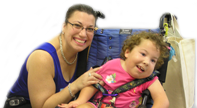2002 Training Symposium
Monday, October 28, 20028:00am - 11:30am
Location: Washington, DC
Health Disparities Among People with Disabilities
I. Welcome & Overview of Agenda (8:00 - 8:10)
Lisa A. Steffian, M.S, Vice Chair National Training Directors Council of AUCD
II. First Session of Symposium (8:10 - 8:55)
Disparity, Difference, & Inequality- Examining
the Health of People with Disabilities
Presenter: Charles E. Drum, JD, Ph.D., Assistant Professor; Director,
Oregon Office on Disability & Health; Co-Director, RRTC: Health
& Wellness Consortium; Oregon Institute on Disability &
Development/CDRC, Oregon Health & Science University
Session Overview: The purpose of this presentation is to provide
an overview of the best available data regarding the health status
of people with disabilities and review selected recommendations
for addressing these issues. In particular, the presence of disparities
or differences between people with and without disabilities in the
following domains are examined: health status; access to medical
care; access to health promotion and disease prevention programs;
and communication access. A brief explanation of the public health
model of health disparity and difference will be presented. Specific
policy and programmatic recommendations on these issues from a recent
policy forum on health and wellness will be reviewed and discussed.
III. Second Session of Symposium (8:55 - 9:40)
An Overview of the National Center on Physical Activity and Disability
Presenter: James Rimmer, Ph.D., Professor, University of Illinois
at Chicago, Department of Disability and Human Development
Session Overview: The purpose of this presentation is to provide
an overview of the NCPAD project. This will include increasing audience
awareness of an online website providing information on physical
activity for persons with disabilities, an explanation of the role
of the National Center for Physical Activity and Disability, and
providing data on the current demographics on prevalence of inactivity
among this population. Participants will gain knowledge about current
issues related to increasing physical activity among persons with
disabilities, physical activity programs that are accessible to
people with disabilities nationally and locally, strategies for
customizing home-based and community-based exercise programs, and
discover how to use NCPAD as a resource for all programming activities
related to this area.
IV. Break (9:40- 9:50)
V. Third Session of Symposium (9:50 - 10:35)
Secondary Conditions Among Adults with Developmental
Disabilities: Models for Assessment, Planning, Intervention, and
Evaluation
Presenters: Tom Seekins, Ph.D. Associate Director for Research
for the Rural Institute on Disabilities and Director, RTC: Rural;
Meg Ann Traci, Ph.D. Director, Living Well Under the Big Sky; Rebecca
Burke, Research Associate; & Kathy Humphries, Ph.D. Research
Associate
Session Overview: There has been an explosion of interest in the
health and wellness of people with disabilities over the past several
years. One aspect of this focus has been prevention and management
of secondary conditions. This presentation will outline a model
for assessing secondary conditions, risk factors, and medical service
utilization among adults with developmental disabilities living
in supported environments, provide data on the prevalence of conditions,
highlight how the measures can be used to assess the affectiveness
of individual plans, point to findings showing the relationship
between personal assistant turnover and increased medical costs,
and highlight the systematic development of an intervention (focused
on nutrition) stemming from surveillance. Its use in staff training
will also be mentioned. This model was developed in collaboration
with university-based researchers, consumers, community service
providers, and state policy makers. It was supported by funding
from the Montana Developmental Disabilities Planning and Advisory
Council and by funds from the Centers for Disease Control and Prevention.
VI. Fourth Session of Symposium (10:35 - 11:20)
Improving Access to Interdisciplinary Evaluations
for Children with Disabilities Living in Appalachia
Presenter: Ronald L. Lindsay, MD, FAAP, Nisonger Center UCEDD,
The Ohio State University, Columbus, OH
Session Overview: Children with disabilities and their families
living in Appalachia encounter several barriers to access to quality
care. These barriers include: families being uninsured or underinsured,
lack of diagnostic teams and referral sources, fragmented services,
and lack of coordination between consultants, care providers, the
local community and families. This interactive session will draw
upon the experience of the participants and faculty to discuss innovative
strategies for solving these unique challenges. Topics include:
1) developing strategies for establishing linkages between UCEs,
local health care providers, community-based agencies and families;
2) integration of service delivery models with the training, technical
assistance, consultation, and research model utilized in UCEs and
LEND programs, 3) various options for funding; and 4) techniques
in creating integrated, interdisciplinary systems of evaluation
and service provision for children with disabilities. The session
will include discussion of a model collaboration effort between
a UCE/LEND program, families of children with disabilities, federal/state/local
agencies, and Appalachian communities. This unique teaming enables
a natural transition from a traditional center-based care model
to a community-based, integrated, seamless systems of care consistent
with the Medical Home model. The emphasis on local control and collaboration
facilitates innovation and a shared vision that permits the development
of successful methodologies to meet the individual needs of Appalachian
communities.
VII. Closing & Collection of Evaluations (11:20-11:30)
Lisa A. Steffian, M.S, Vice Chair National Training Directors Council of AUCD
Pick up Box Lunches after turning in your evaluation!







